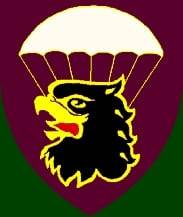A friend of mine was a Parabat
Everybody had to do two years national service in South Africa. This included basic training which, if I remember correctly, lasted for 3 months. This was tough for many and there was an ongoing debate about whether you should go to the army straight from school, when you would be more able to handle being shouted at, or after university when you would be even less receptive to the world of the shouty corporal and the raw recruit.
When my friend joined the army he came under the command of a Major Adams. Major Adams was tough. South African army tough. He mocked the middle-class, baby-faced recruits, calling them his “little girls” and pushing them incredibly hard. Far too hard, they thought. Everyone hated him.
It is the one of the oldest tricks in the military book to create bonds between raw recruits by making them unite in hating a superior. But for Major Adams – and almost all like him – being tough on the recruits was necessary. In fact, like parental love, it is the real meaning of tough love. Because the standard of the training had a direct impact on the survival chances of the recruits.
My para friends spoke about Major Adams after their 2 years national service with awe, sometimes with tears and always with tangible affection. They toasted him when drunk and when they were sober they said they survived because of Major Adams – and because of luck.
It was not just his training that moved these experienced soldiers to speak so openly and so emotionally in such an incredibly macho country about another man. They told of how one day a fellow para’s chute deployed incorrectly with one of the ropes caught over the top of the chute making it look like a giant cupcake and dangerously reducing the braking power of the parachute. One of Major Adams’s “little girls” was hurtling towards the earth, seconds away from a broken back or death.
Major Adams had already jumped and the panicked 19 year old overtook him. Major Adams cut away his own main chute, freefalled after his soldier, grabbed hold of him and locked his legs around him. Then he cut the half open chute away, deployed his own reserve chute and they both landed, hard and far too fast – but alive. When everybody had landed Major Adams made them all put in extra hours packing, unpacking and repacking parachutes – making everyone check each other. No champagne. Just more practice.
The coaching that I do will not decide whether my clients live or die. Or whether they will have broken legs or suffer a broken back. I have no idea how Major Adams carried that huge responsibility. Major Adams is a hero to me, not just for the life he saved that day, but for all the other lives he saved and the effort and the emotion he put into training them.
Although I never met the man, I knew plenty like him. He influenced how I coach in my comparatively trivial sector and why I love coaching and take the job of coach seriously. My stomach churns when I see a client calling me and I do not know whether they got the job or not, won the election or not, got the big deal or not. I don’t know whether the call means I have to console and rebuild or whether we can celebrate together. I prefer the celebration calls – that drives me too.
Good coaching can change my clients’ careers, their reputations, their income and their lives. So I apologise for not apologising to my clients if I am sometimes tough with them and why I stand by my motto of “Good Enough Seldom Is”. It is in their interest, after all.

